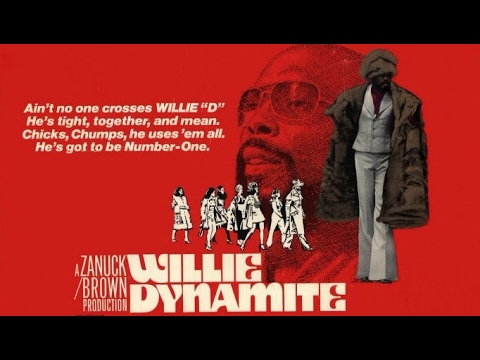Starring: Roscoe Orman, Julian Diana Sands, Thalmus Rasulala and Joyce Walker
Rated: R Crime/Drama
In this film, the titular character is called “Willie Dynamite” (Roscoe Orman) by those in the bustling, urban lifestyle he lives in the Manhattan borough of New York City. His family, who lives in a rural community, simply calls him “Willie”. They, excluding his mother, believe he works within the music industry. His mother believes something more nefarious is at play and is unaccepting of the “gifts” he showers her with, as she knows they have been bought with ill-gotten gains. Accordingly, she encourages him to return home, reconnect with God and live an honest life.
Working as a pimp, Willie Dynamite has a “stable”, or collection, of seven women. Each of the women are of different ethnicities and they work as prostitutes for him. Willie Dynamite is flashy with his wealth, from his customized orchid purple Cadillac with gold detailing to his fur-trimmed, brightly hued clothing, accompanied by matching hats. A determined man, he manages his successful business in a highly systematic order to maximize his profits.
However, being determined and efficient may not be enough for the trials that soon visit Willie. In a meeting of the “pimp council”, called by its leader, Bell (Roger Robinson), it is suggested that the pimps present “collectivize” or create a union. With a united front, they could better protect their businesses from the raids of the police, who are working to extinguish the activities of those involved in vice.
Willie has experienced this increase of diligence by New York officers. He recently has had run-ins with two detectives, Porter (Albert Hall), a Black detective who is a Muslim, and his partner, Celli, a White detective. In listening to Bell and thinking over his proposal, all, except Willie, in attendance agree with Bell. The reason for Willie’s refusal to work with the others is that it would diminish his own business, power and ultimate plans to reign at the top over his peers. His refusal leads him to become an outcast.
Because of the raids on vice, Pashen (Joyce Walker), one of Willie’s workers, is arrested. As the youngest and newest in his stable, she has little experience of the extreme dangers and vicious brutality of the “glamorous” life that she has chosen to lead under Willie’s direction. Soon, dissension grows between her and Honey, (Norma Donaldson), the lead prostitute or “bottom whore”.
However, the largest problem for Willie will be Cora (Diana Sands), an African-American social worker who is willing, by any means necessary, to rescue Pashen, and even Willie, from the life of vice. Cora, a former prostitute, dates Daniels (Thalmus Rasulala), an assistant district attorney who descends from an affluent Black family; his father is a state supreme court judge.
With opposition hitting Willie from all directions, will he be able to ascend the ranks of hustling to make it to the top … and at what costs?
Originally screened in theaters of New York, Los Angeles and San Francisco as a limited-release, Willie Dynamite is a bit different from many other Blaxploitation films of that era. It features a woman, Cora, who is the “enemy” of the main character. While her intent is positive, the aims of Willie are destructive.
There is a cautionary message that is intertwined within this Gilbert Moses-directed motion picture that is rarely seen in films like Willie Dynamite. As David Walker wrote in his review of the film on DVD Talk, “If there were ever a Blaxploitation movie that could be mistaken for a Greek tragedy, it would have to be Willie Dynamite … it is perhaps the most realistic portrayal of the pimp … showing the mental manipulation that allows a pimp to keep his bitches in check. On the other hand, the film is like a surreal fairy tale — an urban fable that uses twisted irony, dark comedy and street brutality to tell its story. It’s almost like a Ralph Bakshi cartoon come to life. The outrageous costumes worn by Willie only add to the surreal feeling the film has and help to lighten what is ultimately a dark and disturbing film.”
The soundtrack was created by jazz composer and arranger, J.J. Johnson, who is known for being one of the earliest trombonists to perform be-bop. Although its lead song was sung by R&B singer Martha Reeves, the soundtrack was not well-received.
Since its release, the film, Willie Dynamite, has become a cult classic, inspiring those in hip-hop, such as rapper, Willie D, of The Geto Boys, and in film, including the pimp council scene of Black Dynamite.

